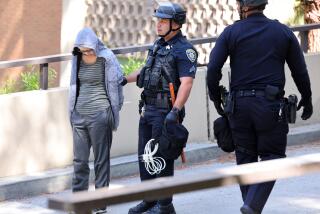Lawyer’s Special Interest Pays Off
During the relatively few years of Mary-Christine Sungaila’s legal career, she has worked hard to earn a position with a top law firm.
But it is her off-duty work that has taken the 29-year-old Newport Beach resident all the way to the U.S. Supreme Court.
Sungaila, an attorney with the Newport Beach office of Irell & Manella, appeared before the Supreme Court last month, a scant six years after earning a law degree from UCLA.
“There are a lot of lawyers who tell me: ‘I’ve been in practice for 30 years and I’ve never even been there!’ she said. “It was a great privilege.”
Sungaila filed a legal brief in the case against a former Tennessee county judge whose conviction on 11 counts of sexual assaults, including two rapes, was overturned a year ago by a federal appeals court.
Officials in Dyersburg, Tenn., had refused to prosecute David Lanier, a mayor for 14 years before becoming a powerful county judge. His brother was the county prosecutor. Lanier was charged by federal prosecutors using the 123-year-old Ku Klux Klan Act, enacted after the Civil War to allow federal officials to prosecute Southern sheriffs.
But in January 1996, the U.S. Court of Appeals in Cincinnati ruled that the federal civil rights laws used to convict Lanier do not specifically address the issue of sexual assault by public officials. The court ordered him freed.
Sungaila contends that the constitutional view taken by the appeals court is too narrow.
“What’s at stake here is the constitutional right to bodily integrity, which the court has determined has existed in other contexts,” she said. “To women, the decision will have a large impact. The courts have said that excessively beating someone you have in custody, like Rodney King--that kind of excessive force violates the Constitution.
“And yet this circumstance of something seemingly even more invasive--of raping someone--that doesn’t violate the constitutional right of bodily integrity? That sends a terrible message to women, that they are protected if they are merely beaten [by a public official], but if they are sexually violated, they are not protected by the Constitution.”
Sungaila’s growing reputation as a scholarly interpreter on issues of gender bias in the courts and women in the law brought her to the attention of the Southern Poverty Law Center and other organizations seeking to overturn the appeals court decision. She was asked to write the legal brief in support of reinstating Lanier’s conviction.
“If the Constitution isn’t allowed to evolve to protect the right to bodily integrity in different contexts, then you have an incredible shrinking of the civil rights statute and of the types of civil rights that it will protect. This is a very good case to decide these kinds of issues.”
A decision is expected by summer.
At Irell & Manella, Sungaila’s energies are focused on the defense of those accused of crimes, but the law firm willingly donated part of her time to the Lanier case. And though she has appeared in court many times during her brief legal career, the Lanier case is her first courtroom test on issues to which she has devoted so many off-duty hours. She takes it in stride that it just happened to be the highest court in the country.
“It was kind of surreal, actually. All these justices--I’d read so many of their opinions--and I was about three feet away from them. But it was interesting. The Supreme Court, as compared to many of the appellate courts, is more welcoming. Usually the [appeals court] benches are much more elevated and the judges are staring down at you.
“There seems to have been an effort in the architecture of the room to make the audience and the lawyers more connected to the bench, because they’re sitting much more at your level. It’s a very small courtroom too. The building is large, but the courtroom is relatively intimate.”
It was also memorable for Sungaila to have shared the courtroom with Justice Sandra Day O’Connor, the first woman to be appointed to the Supreme Court. When O’Connor graduated from Stanford Law School at the top of her class in 1952, no law firm would hire her because she was a woman.
Sungaila has not suffered from that kind of discrimination. But a more subtle kind of bias continues for lawyers and clients who are women, according to studies commissioned by state courts and bar associations, she said.
Those studies “uniformly found that there is gender bias in the court system, that women lawyers are not treated the same as male lawyers, that female clients are not treated with the same level of credibility,” Sungaila said. “That opened my eyes, showing me that this still exists.”
(BEGIN TEXT OF INFOBOX / INFOGRAPHIC)
Profile: Mary-Christine Sungaila
Age: 29
Hometown: Mountain View, Calif.
Residence: Newport Beach
Family: Single
Education: Bachelor’s degree in political science from Stanford University; law degree from UCLA
Background: Lawyer with Irell & Manella law firm (Newport Beach) since 1992; published writer and symposium lecturer on gender bias in the courts and women in the law; editor, Woman Advocate Committee newsletter published by the American Bar Assn.; contributor, “The Woman Advocate: Excelling in the ‘90s”; member, Gender Equity Committee of the Orange County Bar Assn.
Pro bono work: Attorney of record representing Southern Poverty Law Center, National Assn. of Human Rights Workers and California Women’s Law Center in pending U.S. Supreme Court case to determine if there are constitutional protections for women from rape and sexual assault committed by a public official
On women in the law: “A little over 100 years ago, the U.S. Supreme Court was saying that a woman should not be allowed to practice law because her ‘paramount destiny and mission is to fulfill the noble and benign offices of wife and mother.’ I realize how far we’ve come.”
Source: Mary-Christine Sungaila; Researched by RUSS LOAR / For The Times
More to Read
Start your day right
Sign up for Essential California for news, features and recommendations from the L.A. Times and beyond in your inbox six days a week.
You may occasionally receive promotional content from the Los Angeles Times.





